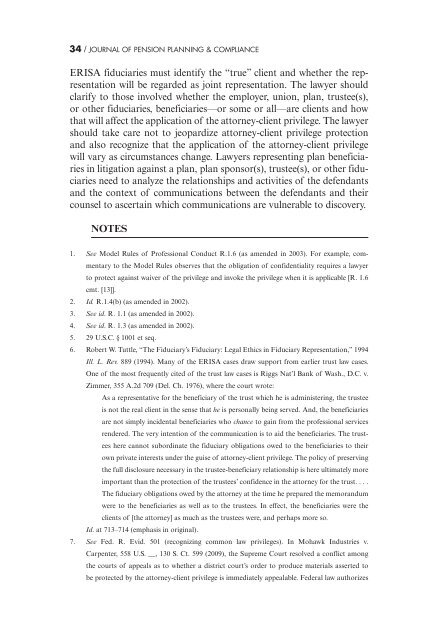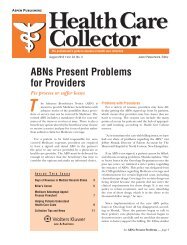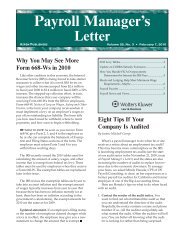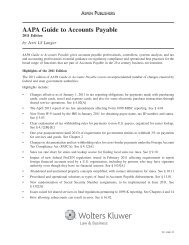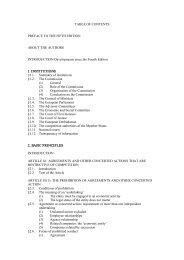journal of pension planning & compliance - Kluwer Law International
journal of pension planning & compliance - Kluwer Law International
journal of pension planning & compliance - Kluwer Law International
You also want an ePaper? Increase the reach of your titles
YUMPU automatically turns print PDFs into web optimized ePapers that Google loves.
34 / JOURNAL OF PENSION PLANNING & COMPLIANCE<br />
ERISA fiduciaries must identify the “true” client and whether the representation<br />
will be regarded as joint representation. The lawyer should<br />
clarify to those involved whether the employer, union, plan, trustee(s),<br />
or other fiduciaries, beneficiaries—or some or all—are clients and how<br />
that will affect the application <strong>of</strong> the attorney-client privilege. The lawyer<br />
should take care not to jeopardize attorney-client privilege protection<br />
and also recognize that the application <strong>of</strong> the attorney-client privilege<br />
will vary as circumstances change. <strong>Law</strong>yers representing plan beneficiaries<br />
in litigation against a plan, plan sponsor(s), trustee(s), or other fiduciaries<br />
need to analyze the relationships and activities <strong>of</strong> the defendants<br />
and the context <strong>of</strong> communications between the defendants and their<br />
counsel to ascertain which communications are vulnerable to discovery.<br />
NOTES<br />
1. See Model Rules <strong>of</strong> Pr<strong>of</strong>essional Conduct R. 1.6 (as amended in 2003). For example, commentary<br />
to the Model Rules observes that the obligation <strong>of</strong> confidentiality requires a lawyer<br />
to protect against waiver <strong>of</strong> the privilege and invoke the privilege when it is applicable [R. 1.6<br />
cmt. [13]].<br />
2. Id. R. 1.4(b) (as amended in 2002).<br />
3. See id . R. 1.1 (as amended in 2002).<br />
4. See id . R. 1.3 (as amended in 2002).<br />
5. 29 U.S.C. § 1001 et seq.<br />
6. Robert W. Tuttle, “The Fiduciary’s Fiduciary: Legal Ethics in Fiduciary Representation,” 1994<br />
Ill. L. Rev. 889 (1994). Many <strong>of</strong> the ERISA cases draw support from earlier trust law cases.<br />
One <strong>of</strong> the most frequently cited <strong>of</strong> the trust law cases is Riggs Nat’l Bank <strong>of</strong> Wash., D.C. v.<br />
Zimmer, 355 A.2d 709 (Del. Ch. 1976), where the court wrote:<br />
As a representative for the beneficiary <strong>of</strong> the trust which he is administering, the trustee<br />
is not the real client in the sense that he is personally being served. And, the beneficiaries<br />
are not simply incidental beneficiaries who chance to gain from the pr<strong>of</strong>essional services<br />
rendered. The very intention <strong>of</strong> the communication is to aid the beneficiaries. The trustees<br />
here cannot subordinate the fiduciary obligations owed to the beneficiaries to their<br />
own private interests under the guise <strong>of</strong> attorney-client privilege. The policy <strong>of</strong> preserving<br />
the full disclosure necessary in the trustee-beneficiary relationship is here ultimately more<br />
important than the protection <strong>of</strong> the trustees’ confidence in the attorney for the trust. . . .<br />
The fiduciary obligations owed by the attorney at the time he prepared the memorandum<br />
were to the beneficiaries as well as to the trustees. In effect, the beneficiaries were the<br />
clients <strong>of</strong> [the attorney] as much as the trustees were, and perhaps more so.<br />
Id . at 713–714 (emphasis in original).<br />
7. See Fed. R. Evid. 501 (recognizing common law privileges). In Mohawk Industries v.<br />
Carpenter, 558 U.S. __, 130 S. Ct. 599 (2009), the Supreme Court resolved a conflict among<br />
the courts <strong>of</strong> appeals as to whether a district court’s order to produce materials asserted to<br />
be protected by the attorney-client privilege is immediately appealable. Federal law authorizes


